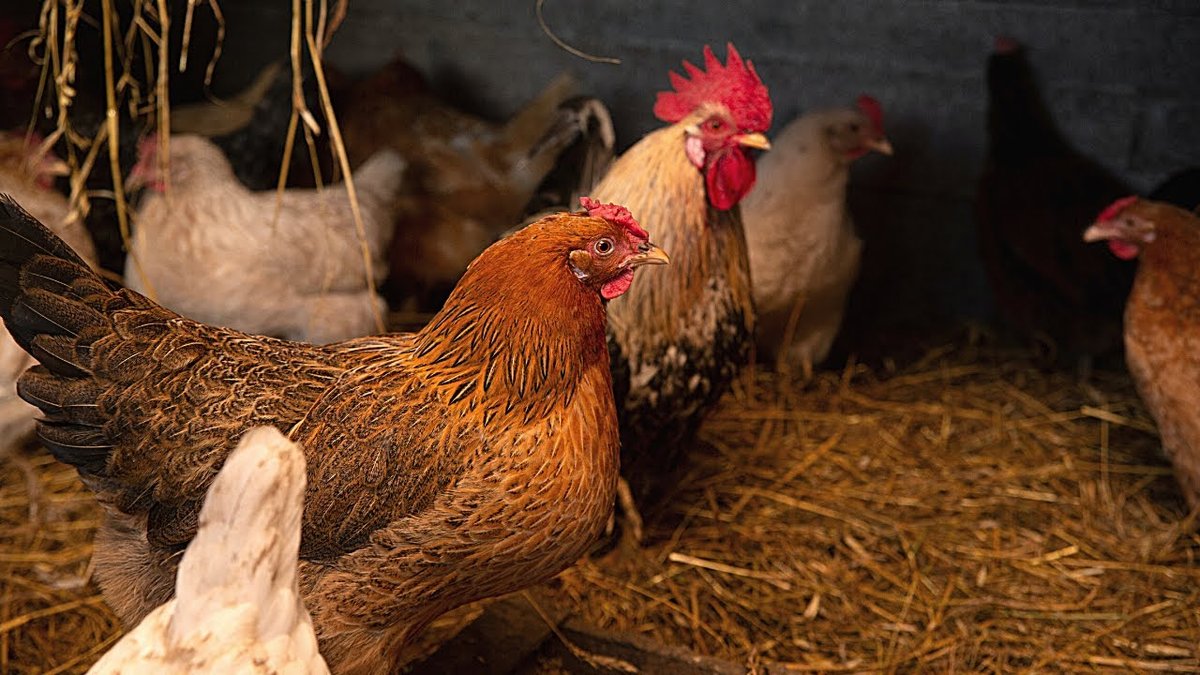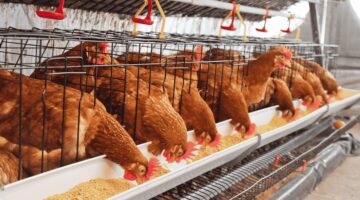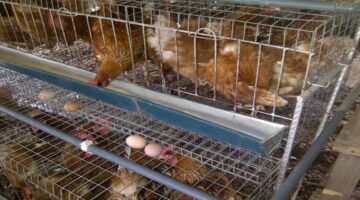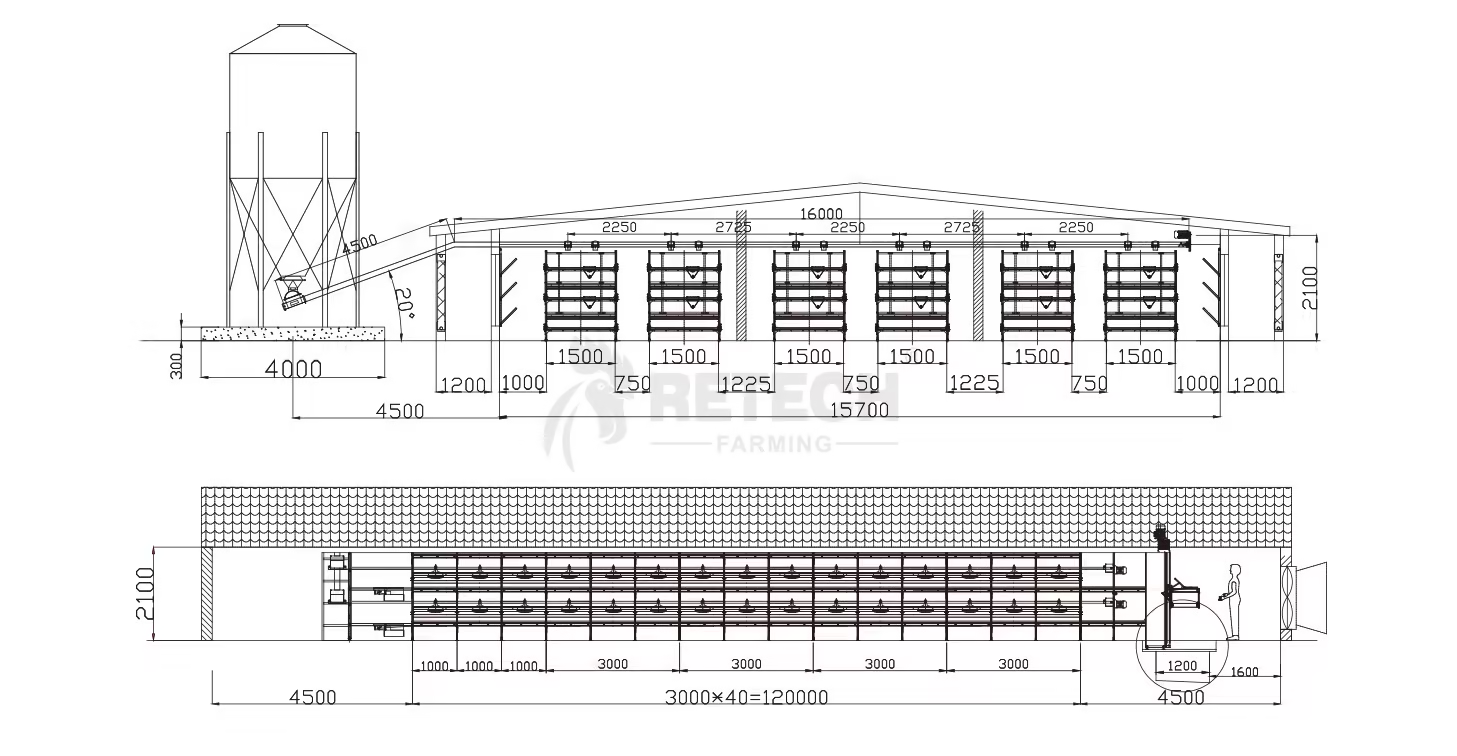As a Nigerian farmer, you’re faced with a critical choice in the Broilers vs Noilers debate – the fast-growing broiler or the resilient Noiler? With the cost of feed rising every day, making the right decision for your poultry business has never been more important. Many farmers are asking the same question: which bird will make me more money? This guide is here to answer that burning question. We will look deep into the differences between broilers and Noilers, a special Nigerian hybrid chicken.
Noilers were developed right here in Nigeria by Amo Farm Sieberer Hatchery to solve the problems many local farmers face. They are strong, can survive tough conditions, and give you both meat and eggs. This guide will compare everything from feeding costs to market price, helping you understand if Noiler farming is truly profitable in Nigeria compared to the traditional broiler farming we all know. By the end of this article, you will know exactly which chicken is the best fit for your farm in 2025.
Understanding Noilers: Nigeria’s Dual-Purpose Innovation
So, what exactly is a Noiler chicken? Think of it as a proudly Nigerian innovation designed for the Nigerian farmer. Noilers are not a random mix; they are a carefully developed hybrid poultry breed, a cross between the tough, disease-resistant Nigerian indigenous chicken and the bigger, meatier White Plymouth Rock breed. This mix gives them the best of both worlds, making them the perfect dual-purpose poultry for Nigeria.
The Story Behind the Breed
Amo Farm Sieberer Hatchery, under the leadership of Group Managing Director Dr. Ayoola Oduntan, developed the Noiler to solve a specific problem: many small-scale farmers in places like Ogun State and other rural areas struggled with broilers that were expensive to feed and often died from common diseases. They needed a bird that was as hardy as a local chicken but grew faster and produced more eggs. The Noiler was the answer—a low-cost, high-yield bird perfect for backyard farming in Nigeria.
The success of this innovation was confirmed in February 2025 when Nigeria’s poultry industry marked a significant milestone with the commissioning of a state-of-the-art Noiler Hatchery in Awe, Oyo State. Boasting a monthly capacity of over 2.5 million Day-Old Chicks, this facility, managed by Managing Director Dr. Anand Burra, demonstrates the growing recognition of Noilers as a game-changer in Nigeria’s quest to enhance protein accessibility.
What Makes a Noiler a Noiler?
The main advantage of Noilers is their dual-purpose nature. This means you can raise them for both meat AND eggs, giving you two ways to make money from the same flock. They come in various colours (black, white, brown, and speckled) just like our local chickens, making them look familiar and appealing in the market.
Here is the key data you need to know:
- Egg Production: Female Noilers can lay between 120-150 eggs per cycle of 75 weeks.
- Meat Production: Male Noilers can grow to a market weight of 2.5-3.5kg by 20 weeks (about 5 months).
In short, the Noiler was built to survive and thrive in Nigerian conditions, offering a more reliable source of income and food for families.
Now that we understand what a Noiler is, let’s see exactly how it stacks up against the well-known broiler.
The Fundamental Difference: Noiler vs Broiler
To really understand which bird is right for you, we need to compare them side-by-side. The table below gives a quick overview, but the real story is in the details of what these differences mean for your pocket and your peace of mind.
| Feature | Noilers | Broilers |
|---|---|---|
| Purpose | Dual (meat & eggs) | Single (meat only) |
| Growth Period | 10-14 weeks (to reach 3-4kg) | 6-8 weeks (to reach 2-2.5kg) |
| Feed Conversion Ratio | 2.5kg of feed per kg of gain | 1.8-2.0kg of feed per kg of gain |
| Disease Resistance | High (thanks to indigenous genetics) | Low (requires intensive care & vaccines) |
| Egg Production | 120-150 eggs/75-week cycle | Minimal/None |
| Feed Requirements | Can forage, less intensive | 100% commercial feed |
| Market Price | Premium (₦5,000 – ₦7,000 per bird) | Standard (₦4,000 – ₦5,000 per bird) |
Growth and Maturity: A Race vs. a Marathon
A broiler’s life is a sprint. They are bred to grow incredibly fast, reaching market size in just 6-8 weeks. This is great for quick turnover. You can learn more about this model in our guide to starting a profitable broiler farm. A Noiler’s life is more of a marathon. The Noiler growth rate is slower, taking 10-14 weeks to reach a good size. This slower growth results in tougher, more flavorful meat that many Nigerians prefer, and it gives the bird more time to build a stronger immune system.
Noiler vs Broiler: Feed Conversion Comparison
The FCR of 1.8-2.0 for broilers means they are extremely efficient at converting feed into meat. For every 1.8kg of feed they eat, they gain 1kg of weight. Noilers have a higher FCR (2.5kg of feed for 1kg of weight gain) because they are not bred for pure speed. However, they make up for this because a large part of their diet can come from free foraging, which costs you nothing. This is a key difference in feed conversion efficiency.
This fundamental difference in biology and purpose directly impacts the most important factor for any farmer: profitability. Let’s break down the numbers to see how much money you can really make.
Is Noiler Farming Profitable in Nigeria? The Financial Analysis
This is the most important question for any farmer. Profit is more than just sales; it’s what you have left after all your expenses. Let’s break down the potential costs and profit from raising 500 Noilers in Nigeria today, keeping the current market reality in mind. This section will demonstrate Noiler chicken profitability.
Recent economic analysis from Ekiti State confirms that poultry production maintains a profitability ratio of 0.39, meaning for every ₦1 invested, farmers generate 39 kobo in profit. With Noilers’ lower feed requirements and dual income streams, this margin can be significantly higher.
Upfront Costs (Capital Expenditure)
This is the money you need to spend once to get started.
- 500 Day-Old Noiler Chicks: At roughly ₦800 per chick, this is ₦400,000.
- Housing (Pen Construction): A simple pen from wood, wire mesh, and roofing sheets for 500 birds can cost around ₦300,000 – ₦500,000.
- Feeders and Drinkers: You’ll need about 15 feeders and 15 drinkers. Budget ₦150,000.
- Initial Vaccines & Medication: For the first few weeks, budget around ₦50,000.
Total Initial Investment: Approximately ₦900,000 – ₦1,100,000.
Running Costs vs. Revenue Streams
- Feed Costs: With commercial feed now at ₦27,800 per 25kg bag, you’d normally need ₦3.34 million for 500 birds. However, because Noilers can forage for up to 30% of their nutrition, your actual feed costs drop to approximately ₦2.34 million. To get a more precise estimate for your specific flock size, you can use our chicken feed calculator. This is a savings of ₦1 million compared to broilers.
- Revenue from Meat: Assuming a small mortality rate and you sell 475 birds. At an average price of ₦6,000 per bird (especially during festive seasons), your revenue from meat would be ₦2,850,000.
- Revenue from Eggs: Let’s say 250 of your birds are female. If each lays an average of 135 eggs over a 75-week cycle, and you sell each egg for ₦50, that translates to about ₦1,120,000 in annual egg revenue.
Total Revenue: ₦2,850,000 (meat) + ₦1,120,000 (eggs) = ₦3,970,000.
Net Profit: ₦3,970,000 (Total Revenue) – ₦2,340,000 (Feed Costs) – Other minor running costs = roughly ₦1,500,000 – ₦1,700,000 profit in the first full cycle.
This detailed analysis shows that Noiler farming is indeed very profitable in Nigeria, offering multiple income streams that make your business more stable.
The 2025 Feed Crisis: Why Noilers Are Winning
With feed costs surging from ₦25,000 to ₦27,800 per 25kg bag as of February 2025, and broiler farmers earning just ₦200 per bird according to current reports, the Noiler’s ability to forage becomes invaluable. While broiler farmers struggle with narrow profit margins, Noiler farmers can reduce feed costs by up to 30% through natural foraging.
One of those key income streams is eggs, but how reliable is it? Let’s dive deeper into their egg-laying habits.
Does Noiler Lay Eggs Everyday? Understanding Egg Production
Let’s be clear about this: No, Noilers don’t lay eggs daily like commercial layers. That’s not what they were bred for. A commercial layer is a specialist bred for one job: laying over 300 eggs a year. For those interested in maximum egg production, our guide to starting a layer farming business is the best resource. A Noiler is a generalist, balancing meat growth with egg production.
Female Noilers produce approximately 3-4 eggs per week once they reach maturity at about 20-24 weeks. This adds up to a total of 120-150 eggs per cycle of 75 weeks. While this is less than a layer, it’s a very valuable bonus income stream that broilers can’t provide at all. The extended 75-week production cycle means you get consistent weekly income for a longer period while waiting for the birds to reach market size for meat.
How to Boost Egg Production in Your Noilers
You can encourage your Noilers to lay more consistently with a few simple tricks:
- Good Nutrition: Ensure they have enough protein and calcium. You can supplement their diet with limestone grit or crushed, dried eggshells. Our ultimate guide to calcium for chickens explains why this is crucial for eggshell quality.
- Consistent Light: Chickens need about 14-16 hours of light per day to lay eggs regularly. You can use a small solar lamp in their pen to extend the daylight hours.
- Clean Water: Always provide fresh, clean water. Dehydration is a major cause of drops in egg production.
The dual income from eggs and meat is just one of the many advantages of farming Noilers. Now, let’s explore the other hidden benefits that make them so suitable for Nigeria.
The Hidden Advantages of Noiler Farming
The benefits of Noiler farming go beyond just profit. They are perfectly suited for the challenges Nigerian farmers face daily.
A Forager’s Diet: Slashing Your Feed Bill
In a time of constantly rising feed prices, this is a major advantage. Noilers have a natural instinct to scavenge. They can get a good portion of their nutrition from kitchen waste (like yam peels, vegetable scraps, and leftover grains), insects, worms, and plants they find while foraging. This not only reduces your feed bill but also means they get a more varied diet, which improves their health.
Built-in Resilience: Fewer Vet Visits
Noiler chickens are known for their resistance to common poultry diseases. This disease resistance results from their genetic makeup and careful selection during breeding. They are less susceptible to diseases like Newcastle Disease and Infectious Bursal Disease (Gumboro) that often devastate broiler flocks, reducing both vaccination costs and mortality rates. While they are resistant, it’s still wise to know how to treat common chicken respiratory infections if they appear.
Dual Income Stream: Your Financial Safety Net
With broilers, all your eggs are in one basket—you only make money when you sell the meat. With Noilers, you can sell eggs weekly to cover small expenses while the birds grow. This creates a much more stable, predictable cash flow for your farm and family.
The Local Market Advantage
The meat is tougher and more flavorful than broiler meat, which is what many people in local Nigerian markets prefer for traditional soups and stews. This means you have a ready market that is willing to pay a premium price for what they consider “real chicken.”
Reduced Environmental Impact
Because Noilers rely less on commercial feed, which requires significant energy to produce and transport, their carbon footprint is much smaller. By choosing Noilers, you’re making a more sustainable choice that is better for the planet and the local environment.
Growing Market Demand and Acceptance
The market demand for Noiler chickens is steadily increasing, both domestically and internationally. Consumers recognize the superior taste and texture of Noiler meat, with its resemblance to indigenous Nigerian chicken. This growing demand creates a lucrative market for farmers who choose to raise Noilers.
These advantages make a strong case for Noilers, but to be fair, broilers still have their place in the market. It’s important to know when they might be the better option.
When to Choose Broilers Over Noilers
To be balanced and honest, broilers are not a bad choice; they are just a different tool for a different job. You should choose broilers if:
You Need a Quick Cash Flip
Broilers are the undisputed kings of speed. If your business model is based on getting a return on your investment as quickly as possible (6-8 weeks), then broilers are the way to go. This is ideal for farmers who want to run multiple production cycles in a single year.
You Have a Large-Scale, Controlled Operation
If you are running a large commercial operation with thousands of birds in a controlled environment (like a battery cage or deep litter system with automated feeders), broilers are more efficient. Their uniform growth rate and predictable feed needs make them easier to manage at scale.
You Have a Reliable Cold Chain
Because broilers are sold for meat only, you often need to process and store them. If you have reliable access to a cold chain (deep freezers and steady power from the grid or a generator), you can manage the logistics of a broiler business effectively.
Broilers are for farmers focused on high-volume, high-speed, intensive production. But what if that’s not your situation?
When Noilers Are Your Best Choice
Noilers are the clear winner for the vast majority of Nigerian farmers, especially if you fit into one of these categories:
The Sustainable Backyard Farmer
If you are practicing small-scale or backyard farming, Noilers are perfect. They can be raised on a semi-intensive or free-range system, requiring less space and capital than a full-scale broiler operation. They will happily turn your kitchen scraps into valuable protein.
The Farmer with Limited Capital
Starting a broiler farm requires a significant investment in feed and medication. With Noilers, the startup and running costs are lower. Their ability to forage and their natural disease resistance mean you spend less money to get them to market.
The Farmer in a Rural Area
If you are in a rural area with limited access to veterinary services or consistent electricity, Noilers are a much safer bet. Their hardiness means you are less likely to lose your entire flock to a sudden disease outbreak.
Noilers are for the farmer who values resilience, low risk, and sustainable, steady income over rapid, high-risk profit.
Why Noilers Are Perfect for Women Entrepreneurs
Noiler farming is especially well-suited for women, who are often responsible for managing small-scale poultry farming in Africa. This model offers a powerful path to financial independence and empowerment.
- Lower Capital Requirements: The start-up costs for Noilers are significantly lower than for broilers, making it more accessible for women with limited access to business loans or capital. This reduces the financial risk and lowers the barrier to entry.
- Manageable Flock Sizes: The semi-intensive or backyard farming approach for Noilers allows women to manage smaller, more manageable flock sizes, which can be integrated with their other household and agricultural responsibilities.
- Ability to Use Kitchen Waste: Noilers’ foraging nature means they can supplement their diet with kitchen waste and scraps. This not only cuts down on expensive feed costs but also makes farming more sustainable and resource-efficient for the household.
- Consistent Weekly Income from Eggs: Unlike the lump-sum profit from selling broilers, Noilers provide a steady, weekly income from egg sales. This consistent cash flow can be used to cover daily household expenses, educational costs, or reinvestment in the business.
Real-Life Success: A Farmer’s Story
The success of Noiler farming is best told by those who have lived it. One successful farmer’s testimonial highlights the life-changing impact of switching to Noilers:
“I was struggling financially before I heard about Noiler birds. I started out as a Mother Unit with 100-day-old chicks… Today, I comfortably brood and sell no less than 500 birds. I am now able to give my kids a good education.”
Maximizing Noiler Profitability: Proven Strategies
Simply raising Noilers is not enough; you need a solid poultry farming business plan to track your costs and maximize your profits. Here are some proven, actionable strategies:
Master the Homemade Feed Mix
You can reduce your feed costs by up to 40% by learning how to make your own chicken feed. A simple starter formula could be:
- Maize (50%): For energy.
- Soya Meal (25%): For protein.
- Groundnut Cake (15%): For more protein and fat.
- Bone Meal (5%): For calcium and phosphorus.
- Vitamin/Mineral Premix (5%): To ensure they get all necessary micronutrients.
Buy these ingredients from local markets and mix them yourself to save a lot of money.
Go Direct-to-Consumer
Bypass the middlemen who eat into your profit. Sell your birds and eggs directly to consumers in your community in Lagos.
- Use WhatsApp: Create a group for your customers and post weekly “price lists” for eggs and available birds.
- Talk to Local “Mama Puts”: Restaurants and food vendors are always looking for reliable suppliers of quality chicken.
- Holiday Pre-Sales: Before festive periods like Christmas and Eid, take orders and down payments from customers. This guarantees your sales and helps with cash flow.
Simple Value Addition
Don’t just sell live birds. You can make more money by offering simple processed products.
- Offer “Dressed” Chicken: Charge an extra ₦500 – ₦1,000 to slaughter, pluck, and clean the chicken for your customers. This is a convenience many people in cities like Lagos will gladly pay for.
- Sell Graded Eggs: Separate your eggs by size and sell the larger ones for a premium. Package them in clean trays or cartons to make them look more professional.
By applying these smart strategies, you can turn a simple poultry farm into a highly profitable business.
Frequently Asked Questions (FAQs) on Broilers vs Noilers for Nigerian Farmers
What is the best age to sell Noilers for meat?
Noilers are ready for the meat market at about 10-14 weeks when they reach a weight of 2.5kg – 3.5kg. This is when they offer a good balance of size and feed efficiency.
How many eggs do Noilers lay in a year?
A female Noiler chicken will lay approximately 120-150 eggs per cycle over a 75-week period. This is less than a commercial layer but provides a valuable and consistent secondary income.
Do I need to use special feed for Noilers?
Noilers can survive and thrive on a mixed diet. While they benefit from commercial feed, they can also get up to 30% of their nutrition from foraging on kitchen scraps, insects, and other waste, which significantly reduces your feed costs.
Conclusion: Making the Right Choice for Your Farm
The February 2025 commissioning of the 2.5 million capacity Noiler Hatchery in Awe, Oyo State confirms what forward-thinking farmers already know: Noilers represent the future of sustainable poultry farming in Nigeria. While broiler farmers struggle with ₦200 per bird profits, Noiler farmers enjoy dual income streams, lower feed costs, and superior disease resistance poultry.
In the end, the choice between Broilers and Noilers is not about which chicken is “better,” but about which chicken is better for you. For the farmer looking to build a long-term, profitable business that can withstand the unique challenges of the Nigerian market in 2025, the Noiler chicken offers a powerful combination of dual income, low costs, and rugged resilience. They are, in many ways, the perfect bird for the modern Nigerian agricultural landscape. For a broader overview of the entire poultry industry, including layers, see our complete guide to starting a profitable poultry business in Nigeria.

Oladepo Babatunde is the founder of ChickenStarter.com. He is a backyard chicken keeper and educator who specializes in helping beginners raise healthy flocks, particularly in warm climates. His expertise comes from years of hands-on experience building coops, treating common chicken ailments, and solving flock management issues. His own happy hens are a testament to his methods, laying 25-30 eggs weekly.



